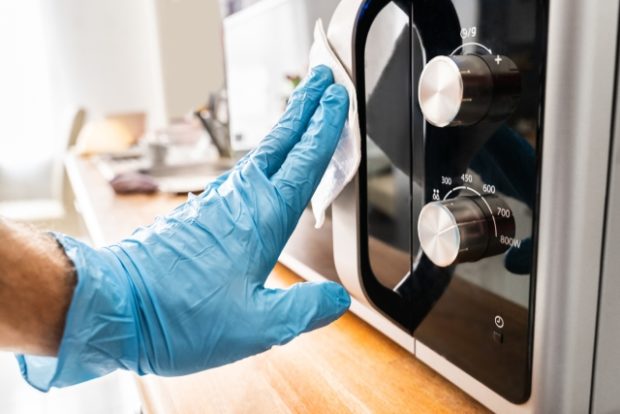
We may not think about it very often but the microwave could be a source of contamination. Image: IStock/AndreyPopov via AFP Relaxnews.
Traces of COVID-19 were discovered by the Chinese authorities on a cutting board this past June.
The smartphone is not the only object in your daily life that can be a nest of filth and germs. Here are some items in your kitchen that you may not think of giving a deep clean, but absolutely must to avoid any risk of contamination by COVID-19.
Microwaves
According to a British study conducted by kitchenware brand Olivers’ Kitchen, eight out of ten consumers in the United Kingdom have never cleaned their kitchen microwave from top to bottom. However, 68% have thought about stripping their conventional ovens in the past year. The microwave is also worthy of a thorough cleaning to remove all traces of COVID-19, which is caused by a new coronavirus strain called the SARS-CoV-2.
Moreover, last April, France’s labor ministry recommended frequent, regular cleaning of microwaves in workplaces in a guide of good practices. The microwave is not a tool to eliminate COVID-19 and the effects of electromagnetic oscillations on the disease are not precisely known, but it is still recommended to keep this appliance clean.
Sponges
How often do you replace your dish sponges? You should throw them away at least once a week. According to a scientific study conducted in 2017 and published in the journal Nature, they may indeed contain up to 362 different species of bacteria, including staphylococci, E.coli and salmonella. According to this report, which consisted of examining the contents of a sponge under a microscope, the kitchen and bathroom were found to be the rooms in the house with the greatest potential contamination by various pathogens — and all because of the sponges!
Dish towels
In the same vein as the sponges to be changed regularly, kitchen towels are no exception to the rule. According to a study published in June 2018 by the American Society of Microbiology, scientists at the University of Mauritius closely examined the contents of the cloths.
Almost half (49%) contained bacteria. Coliforms were detected on 36.7% of them after one month of use, 36.7% had enterococci and 14.3% Staphylococcus aureus. Coming back to the study elaborated by the brand Oliver’s Kitchen, 64% of British people admit they do not clean them regularly. The solution: soak them in a mixture of hot water with vinegar or baking soda before putting them through the washing machine. Of course, do not wash the tea towels at the same time as your fine shirt or favorite jeans.
Cutting boards
The board you use for chopping carrots and other seasonal vegetables could contain, on average, 200 times more fecal matter than your toilet seat. Researchers at the University of Arizona demonstrated this unsavory discovery. Meanwhile, in China, COVID-19 was detected on a cutting board used for preparing salmon bought at a Beijing market. An epidemiological investigation was conducted this spring wherein Chinese scientists demonstrated the salmon could not transmit COVID-19, but the presence of the disease on the cutting board in question remains somewhat of a mystery. CC
RELATED STORIES:
How to clean your smartphone, tablet, laptop to protect yourself from coronavirus
COVID-19: Watch out for these everyday objects that could harbor the disease